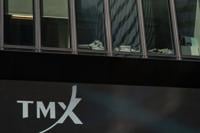TORONTO - Canada's main stock index stepped lower Friday as broad-based weakness led by technology, battery metals and utilities outweighed energy gains, while U.S. markets were mixed amid losses in technology.
Markets mainly declined throughout the day as the Nasdaq led the way down, losing 1.23 per cent Friday.
“If you look at who’s leading things down, it’s chipmakers, it’s Microsoft. Businesses that benefited earlier this year from some of the AI optimism,” said Kevin Burkett, portfolio manager at Victoria-based Burkett Asset Management.
The S&P/TSX composite index closed down 37.38 points at 19,462.86.
In New York, the Dow Jones industrial average was up 39.15 points at 33,670.29. The S&P 500 index was down 21.83 points at 4,327.78, while the Nasdaq composite was down 166.99 points at 13,407.23.
Microsoft Corp. shares fell more than one per cent to close out the trading day, while chipmaker Nvidia Corp. lost more than three per cent.
“I would describe today's tech sourness as a bit of an unwind of some of the earlier-year gains,” said Burkett.
U.S. inflation data released this week has investors grappling with the ongoing realization that interest rates may need to remain higher for longer, he said.
Meanwhile, under the weight of a rapid tightening cycle, the economy is also much more vulnerable to geopolitical shocks, he noted, like the unfolding violence in Israel and Gaza.
Amid reports of an impending ground invasion by Israel in the Gaza Strip, the price of oil surged Friday from recent lows, gaining more than five per cent.
After a months-long steady march toward US$90 per barrel before a recent easing, the price of oil will likely be much more volatile for the near future instead of tied to macro themes, said Burkett.
“Oil’s really become embroiled in the geopolitics, probably more than ... any other commodity or security type.”
U.S. earnings season kicked off Friday with major banks reporting their third-quarter results. JPMorgan’s profit beat analysts’ forecasts, as did Wells Fargo & Co. and Citigroup. The banks are often seen as a bellwether for how the consumer is faring.
“Bank results have been pretty resilient,” said Burkett, noting the banks appear cautious but optimistic.
The Canadian dollar traded for 73.20 cents US compared with 73.22 cents US on Thursday.
The November crude contract was up US$4.78 at US$87.69 per barrel and the November natural gas contract was down 11 cents at US$3.24 per mmBTU.
The December gold contract was up US$58.50 at US$1,941.50 an ounce and the December copper contract was down two cents at US$3.57 a pound.
-- With files from The Associated Press
This report by Ďă¸ŰÁůşĎ˛ĘąŇĹĆ×ĘÁĎ was first published Oct. 13, 2023.
Companies in this story: (TSX:GSPTSE, TSX:CADUSD)








































